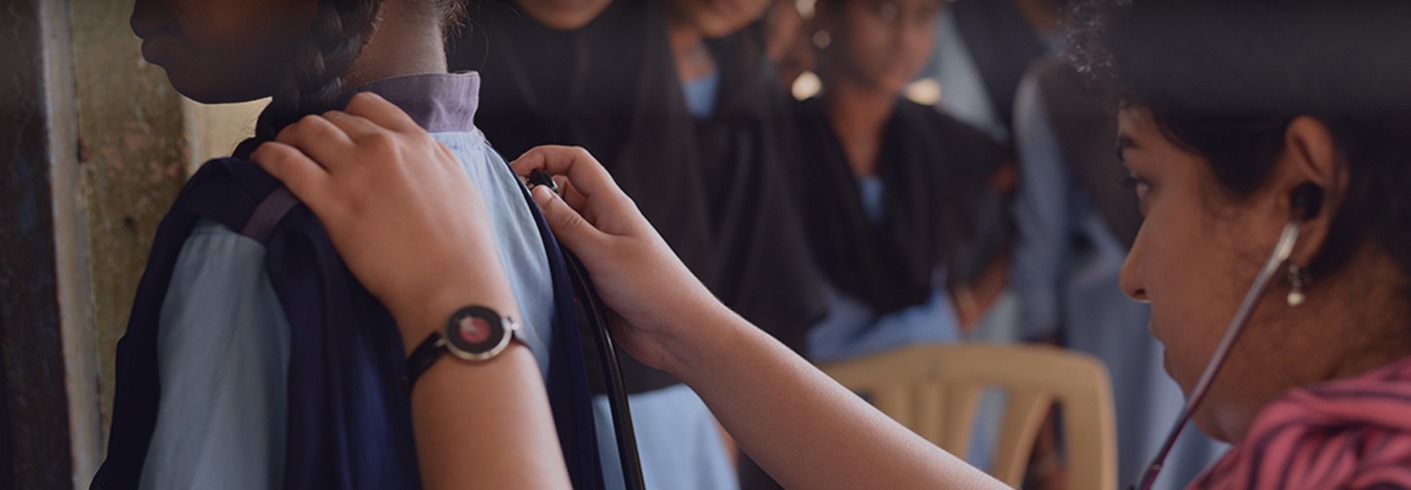
The institutions of the Ramaiah Group offer their expertise and services to the urban population in Bangalore through various initiatives.
- EDUCATION, AWARENESS AND TREATMENT
- SKILLING
- RESEARCH AND TRAINING
1
The Medical College has been providing Urban Health Centre (UHC) services for almost 20 years in Anjanappa Garden and for five years in Cholanayakanahalli. Currently, the Urban Health Centre, set up in 2015, is located at MK Nagar and covers an approximate population of 6,064 people, more than half of whom are slum dwellers. The activities at the centre include dispensing of essential drugs, basic lab services, OPD services, health education, outreach on immunisation, surveys on health and outbreaks, and implementation of National Health Programmes through awareness and guidance.
2
Collaborating with the Sai Mandali Trust, Malleshwaram, the Medical College initiated the School Health Programme in 2007. With an initial reach of 27 schools, they have now expanded to 67 rural and 25 urban schools. These camps focus on health screening of children for early detection of deficiencies and diseases. They also deal with health education for children and teachers, and offer free medicines.
3
In collaboration with the Sai Mandali Trust, Malleshwaram, the Medical College provides primary geriatric care services. These include general health check-ups, monitoring of blood sugar for diabetes, physiotherapy and free medication for those who visit the clinic.
4
Through its Faculty of Dental Sciences, the University has set-up the Dental Social Service unit in the Department of Public Health Dentistry. The department provides dental healthcare education and services to the general public.
5
The Medical College has undertaken the responsibility of providing medical services to four old age homes. As a part of this initiative, which was started in 2009, residents of the old age homes are visited and offered primary health care. Efforts are also made to ensure that they have access to their prescribed medicines. For serious cases, the senior citizens are treated on campus at the Medical College Hospital, at subsidised rates.
6
In collaboration with the Sathya Sai Hospital, the Medical College conducts a health camp on the 4th Sunday of every month that caters to around 1,500 patients every time. During these camps, they investigate cases, dispense medicines and bring patients in need of in-house treatment to the Medical College Hospital on campus.
7
The National Service Scheme (NSS) activities in the Institute of Technology started during 1999-2000 have grown into a movement over the years. The activities of NSS are oriented towards the welfare of the society and include blood donation camps, slum development programmes, skill development programmes, and literacy programmes for adults and drop-outs. They also focus on health, family welfare and nutrition programmes, rehabilitation work during natural calamities and emergencies, amongst a host of other activities.
NSS activities at RIT have won appreciation at the state and national levels.
8
On World Women's Day, special health camps are conducted for women from lower economic sections of society by the Institute of Nursing Education & Research (INER).
9
During World Breastfeeding Week, awareness camps on the importance of breastfeeding are conducted among all stakeholders like mothers, nurses, Anganwadi workers and ASHA workers by the INER.
10
On World Mental Health Day, camps are organised to create awareness about mental health and its related issues by the INER.
11
Free consultation camps on general wellness, obstetrics and gynaecology, migraine, diabetes, obesity, osteoporosis and ophthalmic diseases are conducted regularly by the Indic Specialty Ayurveda Restoration Hospital.
In association with the Training Department of the Government of Karnataka, the Institute of Technology conducts skill development programmes for school and college dropouts.
Additionally, NSS volunteers also conduct computer training classes and activity-oriented training sessions for students. They even distribute notebooks, clothing and other items to underprivileged individuals.
1
Since 1995, the Medical College has assumed a leadership role in the area of healthcare waste management. They have collaborated with WASTE, Netherlands and the World Health Organization to create a Healthcare Waste Management Cell. This Cell conducts training and advocacy workshops for hospitals either within the Ramaiah campus (the offshore model) or at their campuses (the onsite model). So far, the training programmes have helped hospitals in Karnataka, Odisha, Maharashtra, Gujarat, Punjab and other states. Globally, they have reached out to hospitals in Sri Lanka, Bangladesh, Myanmar, Ghana and all the 11 countries of South East Asia.
2
The University organises the Service to Society Programme for 2 days every year for all its members. Through this programme, the members get exposure to the problems of people living in rural, sub-urban and urban areas. Several members of the University have taken these real life problems for academic pursuits to develop suitable solutions.

